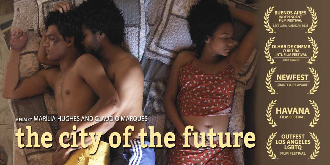
The City of the Future 2016
Distributed by Pragda, 302 Bedford Ave., #136, Brooklyn, NY 11249
Produced by Cláudio Marques and Marília Hughes Guerreiro
Directed by Cláudio Marques and Marília Hughes Guerreiro
Streaming, 75 mins
College - General Adult
Family Relations; Sexuality; Social Problems
Date Entered: 09/29/2021
Reviewed by Laura Harris, Distance & Open Education Librarian, SUNY OswegoThe City of the Future is a dramatic film set in Serra do Ramalho, Brazil. In the film and in life, the city is home to many people displaced by the construction of the Sobradinho Dam in the 1970s. The film takes place in the present day and illustrates how the effects of this displacement can be felt across multiple generations.
Gilmar, a teacher, is the child of one of the displaced, and he is passionate about ensuring that their story is remembered by the next generation (his students). Through scenes set primarily in Gilmar’s classroom, the viewer learns of the impetus for the dam and the aftermath of the displacement. A clear narrative emerges: the hydroelectric company that built the dam failed to deliver on their promises to the displaced. Many people were moved to small homes with no electricity or potable water. Those displaced felt betrayed, and without recourse due to the dictatorial leadership of the country at that time.
Gilmar and his partners, Milla and Igor, experience feelings of displacement in a less literal, but equally poignant manner. The relationship between Igor and Gilmar is portrayed as a deeply romantic and committed one; however, it is also hidden due to homophobia in their community. While Milla and Gilmar’s relationship is more public, it is less clear what drives their relationship; the viewer gets the sense that Milla prefers casual relationships.
When Milla becomes pregnant with Gilmar’s child, Igor begins to question his role in the trio. Eventually he approaches Milla and expresses his interest in helping to parent the child – a proposition she easily accepts. Unfortunately, when the community learns of their polyamorous relationship and plans to coparent the child, the trio are criticized and shunned. Milla is fired from her teaching job and asked to leave her family’s home; Igor’s life is threatened by his homophobic former friends. While Gilmar seems to suffer the least dramatic effects, he loses the respect of some of his students and colleagues.
Each of them struggles with how to respond to the disdain of the community. Milla wants to leave town. Igor distances himself from Gilmar, in the hopes of reducing the backlash experienced by Gilmar and Milla. Gilmar is the one who pushes back – he states that he doesn’t want them to be driven from their home like their parents were. Eventually, the trio reconciles and recommits to raising the child together. In making the decision to coparent and remain in Serra do Ramalho, Gilmar, Igor, and Milla have refused to be displaced — and in doing so, have prevented displacement from becoming a transgenerational trauma.
This film is recommended with reservations. While the film is excellent, its utility in the classroom seems limited. The short runtime of the film prevents a deep dive into either of the two main themes: the construction of the Sobradinho Dam, and polyamory. Its exposition about the dam and the subsequent displacement of the people in that area could be useful in Latin American history or culture courses. However, the more recent Sobradinho (2020), a documentary, might provide a more complete picture of those events and the aftermath. Similarly, the portrayal of the polyamorous relationships might be shown in a human sexuality course, but instructors may be better served by choosing a film that focuses primarily on polyamory.
Note: The film includes two scenes with full nudity, one of which includes masturbation.
Awards: Buenos Aires Independent Film Festival: Best Latin American Film; Olhar de Cinema, Curitiba International Film Festival Jury Award; Newfest, Grand Jury Award; For Rainbow,Festival de Cinema e Cultura da Diversidade Sexual, Best Brazilian Film, Best Director
Published and licensed under the Creative Commons Attribution 4.0 license. Anyone can use these reviews, so long as they comply with the terms of the license.